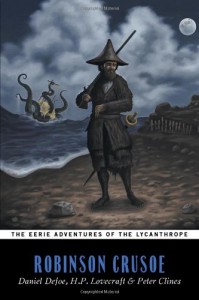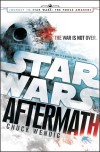The Eerie Adventures Of The Lycanthrope Robinson Crusoe
 I've been on a "Weird Al" kick for the last couple of weeks (due in part to finally seeing him live), and as I was listening to his catalog, I was reminded how I appreciated his parodies so much more in the '80s and early '90s. Back then, I still listened to popular music, and I was familiar with the videos that accompanied them, so I was able to catch all of the subtler jokes that played around with a particular lyric or scene. During the concert, the inhaler joke from "Inactive" was lost on me because I didn't know the Imagine Dragons song well enough to realize there's something similar in the actual song.
I've been on a "Weird Al" kick for the last couple of weeks (due in part to finally seeing him live), and as I was listening to his catalog, I was reminded how I appreciated his parodies so much more in the '80s and early '90s. Back then, I still listened to popular music, and I was familiar with the videos that accompanied them, so I was able to catch all of the subtler jokes that played around with a particular lyric or scene. During the concert, the inhaler joke from "Inactive" was lost on me because I didn't know the Imagine Dragons song well enough to realize there's something similar in the actual song.I bring that up because I've never read Robinson Crusoe, and I feel like much of the impact of the mash-up is also lost on me. As I was reading Clines' retelling of the story using lycanthropy and the Cthulhu mythos, I downloaded a Kindle version of the book to get a sense of how much Clines changed Defoe's original narrative (conclusion: not much), and also to see how much of it he abridged (conclusion: quite a bit), but I didn't bother reading the entire thing. I still feel like I know enough of the story to get a sense of it without having to read it, and having now read The Eerie Adventures of the Lycanthrope Robinson Crusoe, I can't imagine it would be quite as interesting.
In fact, the recent trend of mash-up novels hasn't made much of an impression on me because I haven't read any of the classics they're based on. I was sort-of tempted by Abraham Lincoln: Vampire Hunter because it was more an alternate history story than a mash-up, but even then, I couldn't get too interested in it. The main reason I decided to read TEAotLRC had more to do with Peter Clines than anything else (though I'll admit that the Lovecraftian elements intrigued me more than zombies or sea serpents or vampire hunters or what have you). 14 was enough for me to want to read more of his work.
The thing is, TEAotLRC isn't really Clines. It's more Defoe than anything else. Crusoe being a werewolf is a brilliant addition to the actual story, as it does more to explain Crusoe remaining on the island for so long. Here, Clines tells us that Crusoe was already wracked with guilt over his condition, and over causing the death of one of his shipmates, and he chooses to remain there to protect himself and others. At first, it seems odd to include the lycanthropy angle at all, but the more Clines takes us in that direction, the more sense it makes.
The Cthulhu aspect of the story also works remarkably well, since Cthulhu lived in an underground city in the South Pacific, which is exactly where Crusoe was stranded. As evidenced by Lovecraft getting co-author credit for this novel, Clines lifts large portions of "The Call of Cthulhu" and adds them to the story, putting them in just the right place to make them work with the setting. In fact, the mash-up works so well that I'm surprised that, with all of the Lovecraftian authors out there, this was the first time someone had the idea to put the two stories together.
My only complaint was that it took a long time for the Cthulhu angle to get going in the story, and that once it did, it was still more an afterthought to the stranded-on-an-island story. Clines hinted at it early in the story (on Crusoe's first sea voyage, he's part of a crew that loses their ship to an underwater creature, and he keeps mishearing the captain mutter to "Gon" instead of God), but it wasn't until the halfway point that the mythos started to enter the story. Up until then, it was mostly Defoe, with an occasional reference to the Beast to remind us that this Crusoe was also a werewolf. Once Crusoe befriended Friday, the Lovecraftian elements took another backseat, again to the original story by Defoe.
I admire the potential of this story, and respect what Clines has done by mashing these three stories together, but I can't honestly say I'm a fan of the resulting story. Ultimately, it was too much Defoe and not enough Lovecraft or Clines.






